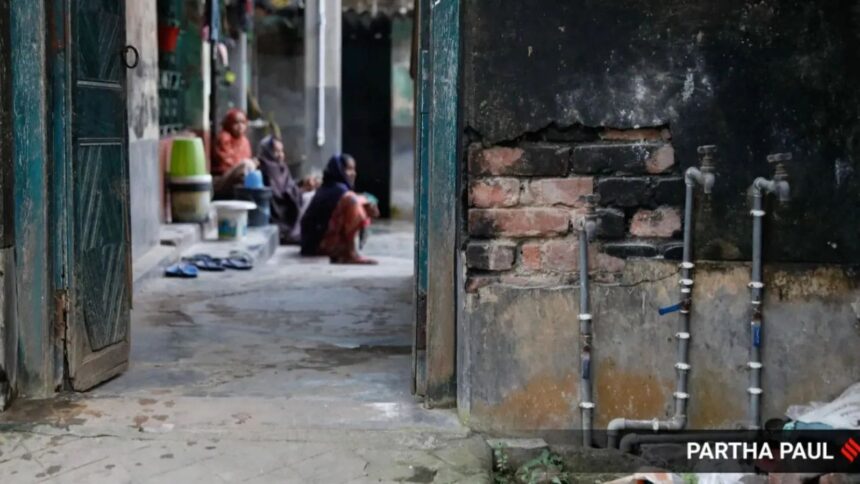THE CENTRE has asked the 100 teams of Central Nodal Officers (CNOs) deputed for related to the design, planning and cost of works and to do “on-spot excavation” on any sample stretch of pipeline and check whether the pipe material is as per the Detailed Project Report (DPR), The Indian Express has learnt.
The Jal Shakti Ministry organised a one-day training for the CNOs on Friday, during which the ministry officials are learnt to have shared a PowerPoint Presentation with the teams.
The CNOs have also been asked to interact with various stakeholders, including District Magistrates/ District Collectors, during their field visits and seek feedback from the beneficiaries.
It is learnt that the CNO teams will conduct five types of assessment of the JJM scheme during their field visits. These are design assessment, quality assessment, time and cost overruns assessment, functionality assessment and grievance and complaint redressal assessment.
To confirm that the JJM works have been done as per the approved DPRs, the CNOs have been asked to do on-spot excavation on any sample stretch of pipeline, check for pipe material and dia as per the DPR and provide deviation details, if any.
To identify reasons for cost overrun, the CNOs have been asked to compare the original sanctioned cost with revised estimate or completion cost. They have been asked to seek “cost records and escalation notes” from the state government officials and mention specific components responsible for cost hike. The CNOs would also seek “written justifications” and “approval” from the authority for the cost escalations. Where the CNOs find an increase in the cost of the JJM schemes, they would examine the DPR and minutes of the meeting of the State Level Scheme Sanctioning Committees (SLSSC). The CNOs have been asked to seek a copy of the SLSSC meeting proceedings and approval letters.
It is learnt that out of 100 officers deputed to inspect the JJM schemes, around 70 attended Friday’s training programme; the remaining 30 officials have been asked to attend the training on Monday. Apart from the top officials of the Jal Shakti Ministry, the teams were also briefed by officials from Central Vigilance Commission (CVC) and Central Public Health and Environmental Engineering Organisation (CPHEEO).
The CVC is the apex government body that is responsible for promoting integrity, transparency and accountability in the country’s public administration. The CPHEEO, an advisory body under the Ministry of Housing and Urban Affairs (MoHUA), provides technical advice to state agencies and urban local bodies (ULBs) on implementing and maintaining urban water supply, sanitation and solid waste management projects.
The officials who participated in the training on Friday have been asked to proceed on field visits from Monday. The ministry expects reports by June 10.
On May 19, the government announced 100 teams of CNOs for “ground inspection” of the JJM schemes across the country. The move followed a meeting chaired by the Cabinet Secretary on May 8 to review the mission’s schemes. An order was issued by the Department of Personnel and Training, deputing 99 IAS officers to inspect as many as 183 schemes across 135 districts in 29 states and Union Territories.
Of these schemes, learnt to have been selected randomly, Madhya Pradesh has the most — 29, Rajasthan and Odisha 21 each, Karnataka 19, Uttar Pradesh 18, Kerala 10 and Gujarat and eight each.
The GOVERNMENT has taken note of the escalation in costs towards providing tap water connections across states ruled by different political parties. A ‘ground inspection’ of work orders in different places will give a picture not just of the costs involved in executing the job, but also the quality of work.
The decision for a review came two months after an Expenditure Secretary-led panel proposed a 46% cut to the Water Resources Ministry’s proposal demanding Rs 2.79 lakh crore for completing the mission over four years ending December 2028. The cut came following hard questions by the Ministry of Finance over cost escalation, and concerns in some government sections that work contracts were inflated in some states. According to sources, many of the 183 schemes shortlisted for inspection entail a cost of Rs 1,000 crore. The cumulative cost of these schemes is about Rs 1.50 lakh crore, which is about 20% of the total cost of all schemes approved under the JJM since its inception, said a source.
Since the launch of the Jal Jeevan Mission in 2019, 6.4 lakh water supply schemes with total estimated cost of Rs 8.29 lakh crore — more than double of the scheme’s original outlay of Rs 3.60 lakh crore (Centre: Rs 2.08 lakh crore, states: Rs 1.52 lakh crore) — have been approved by the states.
To meet the additional requirement of funds, the Jal Shakti Ministry had approached the Expenditure Finance Committee, headed by the Expenditure Secretary, to approve Rs 2.79 lakh crore additional Central funding over and above Rs 2.08 lakh crore. However, the EFC recommended only Rs 1.51 lakh crore as the Central share, which is 46% lower than Rs 2.79 lakh crore sought by the Jal Shakti Ministry, as reported by on April 21, 2023.








